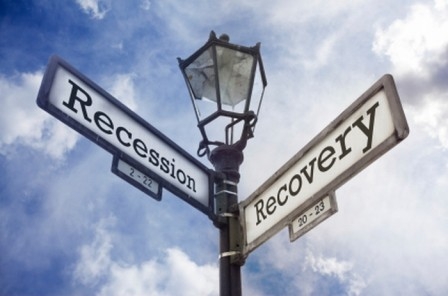If you haven’t heard of Shelby M.C. Davis – and relatively few people have because he’s a very private person – you’re missing the story of one of the world’s great investing families, as well as one of the world’s most generous philanthropists. He’s an all-timer.
The Davis Discipline: Fifty Years of Successful Investing On Wall Street by John Rothchild traces the three generations of Davis men, from the original patriarch Shelby Collum Davis, to his son Shelby M.C. Davis, and the grandsons Andrew and Chris Davis.
The book offers timeless lessons in six condicio sine qua non ingredients for building wealth: In particular, the role of
- Equity-ownership of one’s own business,
- Specialized knowledge
- Hard work
- Massive leverage
- Tightwad behavior, and
- Extraordinary luck.
Equity-ownership
The most important wealth-creating decision Davis Sr. ever made – mirrored later by his son Shelby M.C. Davis – was to found his own business.
Davis Sr. trained as a New York insurance regulator, making a respectable but limited salary from the State. At age thirty-eight he quit his job, borrowed $50,000 from his wife’s family, and set himself up in business as a stockbroker, with a seat on the New York Stock Exchange, specializing in insurance stocks.
Shelby M. C. Davis, his son, made an equally fateful decision in 1968 when he left his job as an analyst at the Bank of New York to join a few partners to found the mutual fund company which eventually became Davis Selected Advisors.
Now, founding a own company does not guarantee wealth, because most new businesses fail, and because lots of people end up earning less working for themselves than they did working for others.[1]
On the other hand, equity ownership is the only way to create significant wealth. Every single large personal fortune – on the Forbes 400 list for example – results from business ownership, usually highly risky and undiversified to start. It might not have worked out – and undoubtedly even the Davises felt the risk of failure in the beginning – but owning their own businesses was the key first step.
Specialized knowledge
Davis Sr. – sitting in his insurance-regulator seat – gained deep insight into the insurance business at a particularly propitious moment. In the post-World War II era, insurance companies traded at extraordinarily cheap valuations.
Davis also happened to combine two great insights. First, he understood value investing before the world had even heard of Warren Buffett. Davis was the president of value-investor Benjamin Graham’s stock analysts’ organization in 1947. Second, Davis dug deeply into the investment portfolios and business practices of insurance companies.
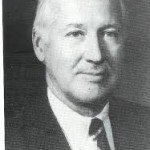
The result of Davis combining these two specialized insights closely resembled Warren Buffett’s path to wealth. Davis’ built his $50,000 initial investment stake into a personal fortune worth close to $900 million by the time he passed away in 1994. As the book reports, most of those gains came from purchasing insurance company shares, just as Buffett’s fortune grew from post-World War II insurance company ownership as well.
Shelby M.C. Davis, his son, invested in a wider variety of US and multinational companies, but his methods sprang from his father’s focus on specialized knowledge. Most importantly, Davis developed the art and science of deep dives into the quarterly reports of public companies as well as thorough independent research to discover attractive companies – classic value-investor practice.
Borrowing to the gills – leverage
Shelby Davis Sr. began his insurance brokerage with limited funds – $50,000 in 1948 – but took advantage of his ability to borrow money as a broker-dealer. Because of consumer protection laws, individuals who purchase stocks “on margin” through their broker can only borrow 50% of the value of their investment. A broker-dealer on the other hand, is allowed to borrow far more, limited mostly by what others are willing to lend them.
Davis Sr. purchased beaten-down insurance stocks for a living, and that alone might have made him a small fortune over his lifetime. Using borrowed funds as a broker-dealer, however, made him a huge fortune. The difference was that he magnified his returns by borrowing huge sums of money for decades.
Of course leverage can giveth, and leverage can taketh away. Sometimes borrowing huge amounts of money leads to a massive blowup of wealth. In Davis’ case, leverage enhanced rather than destroyed his fortune.
In a sense, all fortunes require leverage. Sometimes this is achieved by borrowing huge sums of money as Davis did, or as many real-estate investors do. Sometimes the leverage is actually ‘operating leverage,’ as in the example of the top equity owner of a law firm who employs many junior attorneys to do the work for him while he reaps the benefits at the top of the pyramid.
More recently, social media firms like Facebook and Twitter achieve a different kind of leverage through massive network-effects. The programming and administration work required to support an online network of 10,000 people, for example, becomes much more interesting as a business proposition when extended to the currently estimated 1.3 billion users of Facebook. That’s another kind of leverage.
In any case, you need leverage to create huge wealth.
The $1,000 hot dog – tightwad behavior
Davis family lore tells of Shelby Davis, Sr. taking a walk with his grandson, Chris Davis, in Manhattan. Chris asked granddad whether he would buy him a $1 hot dog. Davis Sr. pounced on his grandson with an object lesson in thrift and compound interest.
Did grandson Chris realize that $1, invested wisely, would double in value in five years? Furthermore, did he realize that this $1, compounded over 50 years, when Chris would be his grandfather’s age, would become worth over $1,000?[2]
Grandfather Davis asked: “Are you so hungry you need to eat a $1,000 hot dog?”
And that, ladies and gentlemen, is how wealthy people get, and stay, wealthy. It’s also an elegant lesson summarizing the key points of pretty much any book on building long-term wealth.[3]
Luck
Let’s face it: Nobody builds a great fortune without a tremendous amount of luck. While it may be true that “the harder I work, the luckier I get,” many hard-working brilliant people who combine business ownership with specialized knowledge and leverage do not achieve the fortunes they seek.
In Davis Sr.’s case, two pieces of luck stand out.
First, he began making leveraged investments in insurance stocks just at the beginning of a period of extraordinary growth. While he had the discipline to never sell, his leveraged investment at the time of a profound equity market downturn could have led to a forced a sale. Luckily for him, his fortune did not suffer that fate.
Second, as author Rothchild describes, Davis Sr. took a pause from investing his fortune between 1968 and 1975, when he served as US ambassador to Switzerland. During that period a bear market in stocks crushed his then-personal fortune of $50 million down to $20 million.
While historical counter-factuals are difficult, Rothchild wonders what would have happened had Davis been more actively involved in investing during those years. His distance from the investing world in precisely those years may have been a piece of extraordinary financial luck.
Later, between 1975, when Davis Sr. returned to managing his money, and his death in 1994, his fortune soared with markets to nearly $900 million.
Giving it all away
Interestingly, Davis Sr. set an amazing precedent with his fortune. He was determined that his heirs should not be handed a large fortune to inherit, so he dedicated the vast bulk of his money to political causes he believed in.
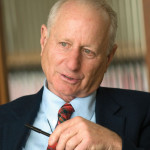
His son, Shelby, who established his own mutual fund business independently of his father, earned his own fortune. Although Shelby Jr.’s sons have taken over management of that business, he has made it clear to them that they will not inherit his wealth either.
In fact, I met Shelby Davis because he is in the process of giving away his fortune, as fast as he can, to support higher education for students from all over the world.
Another reason I’m interested in this book, and the Davis family
Shelby M.C. Davis, the son, happens to be a personal hero of mine.
Around the time he turned 60, Davis deeply embraced his father’s model that children should not inherit money. Children should be taught important lessons about building wealth, but ultimately they need to stand on their own and earn their own way.
The Davis family mantra is “Learn, Earn, Return” – describing the 3 phases of a good life. After studying at Princeton and working for Bank of New York in his first thirty years of Learning, and then building a successful mutual fund company over the next 30 years of Earning, Shelby decided to Return the bulk of his wealth to a cause he believed in, just as his father had.
In the late 1990s he worried that American students were overly parochial in their understanding of the world beyond our borders. The future, he believes, belongs to people who can think and act internationally.
As a result of this belief, and his plan to Return his fortune, he became the leading benefactor of my favorite institution, the target of my own philanthropy.
Davis discovered the United World College of The American West – a two-year International Baccalaureate high school with 220 students from 70+ countries, dedicated to leadership training, fostering an international social conscience, and bettering the human condition.
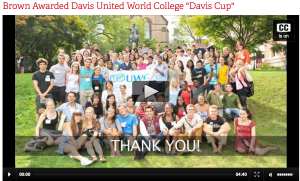
Over time, Davis realized that not just the US students, but also the students arriving from abroad, had the power to transform US higher education for the better by internationalizing US university campuses.
He invested – with little fanfare or even recognition – close to $100 million of his wealth in supporting this institution and its sister schools, the other 13 United World Colleges around the world.
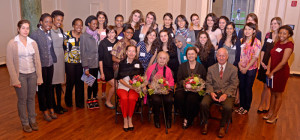
On top of that extraordinary commitment, Davis currently supports 2,400 United World College graduates at 90 US universities studying for their undergraduate degrees, through the Davis United World Scholars Program. He’s spending tens of millions of dollars per year of his fortune on this program to simultaneously transform individuals’ lives and to internationalize US higher education.
As Davis says, the point is to ‘plant seeds of hope’, by supporting the higher education and leadership training of extraordinary young people from all over the world. Do you want to feel hopeful about the future of the world? Check out these UWC students at Brown University.
I’ve written and done interviews before about the extraordinary commitment it takes to pay for one child’s undergraduate education, but what about taking on financial responsibility for 2,400 undergraduates at the same time?
He funds this commitment year after year, sending tens of millions of dollars out of his future estate, both to help the students and to ‘save his sons’ from the burden of inheritance.
Basically, it’s ridiculous. Shelby Davis is amazing.
I recommend reading The Davis Discipline because it shows how some people accumulate extraordinary wealth.
I recommend studying Shelby M.C. Davis’ life because it shows how personal wealth can be dedicated to a higher purpose.
NB: A version of this book was also published by John Rothchild as The Davis Dynasty: Fifty Years of Successful Investing on Wall Street
Please see related posts:
Philanthropy Part I – Giving Money Away
Teaching kids Compound Interest
On Entrepreneurship, Part I – Fixed Income vs. Equity Ownership
Similar to the $1,000 hot dog: Bach’s Latte Effect from The Automatic Millionaire
[1] Just ask your friendly Anonymous Banker. And review this tale of woe.
[2] Clever users of the compound interest or discounted cash flow formula will easily calculate that grandfather Davis was assuming an approximate 15% annual compound return. An aggressive assumption for sure, but he managed to earn better than that during his investing career.
[3] Such as, just to offer a few examples, the recently reviewed Automatic Millionaire, The Intelligent Investor, 25 Myths You’ve Go To Avoid If You Want To Manage Your Money Right, The Only Investment Guide You’ll Ever Need, Simple Wealth Inevitable Wealth, and The Millionaire Next Door.
Post read (4999) times.



